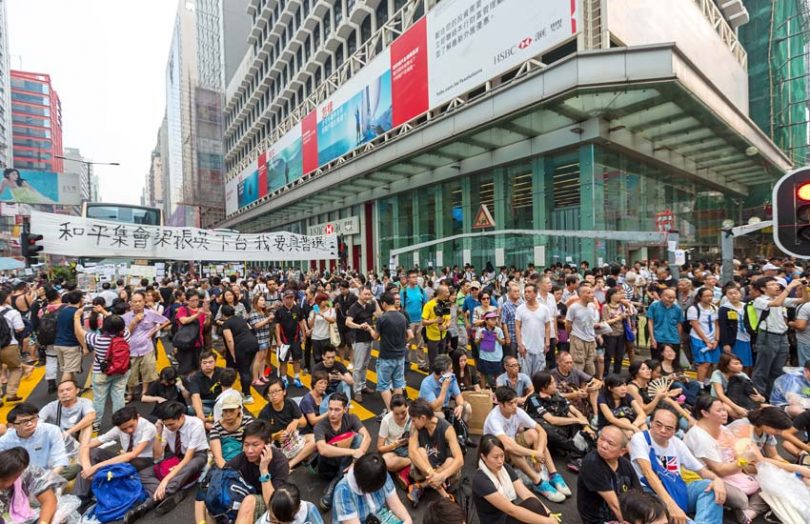Since last Wednesday, HSBC has grabbed headlines because the group’s Asia Pacific CEO Peter Wong endorsed China’s draft national security law for Hong Kong, which criminalizes subversion and secession. It’s seen as putting an end to the freedom of Hong Kong citizens to make peaceful public protests.
But this isn’t HSBC’s first political move. Last September, HSBC Hong Kong was very supportive of efforts to internationalize the renminbi. More than that, it sees itself as well placed to gain from such a step.
The current backlash
This is the second time China has proposed national security legislation in Hong Kong. From China’s perspective, it wants to quell Hong Kong protests that could set a precedent on the mainland. The 1989 Tiananmen Square demonstrations had a tragic end.
Putting the Hong Kong situation in perspective, until last week, Hong Kong was ranked as the third most “free” place in the world according to the CATO Freedom Index, after New Zealand and Switzerland. China is in 126th spot.
This week the HSBC backlash has escalated following a report that HSBC’s Chairman Mark Tucker lobbied Boris Johnson’s advisers warning of reprisals if Huawei is prevented from selling 5G telecoms equipment to the UK. China is rumored to have threatened to pull out of building a UK nuclear power plant.
U.S. Secretary of State, Mike Pompei, portrayed Peter Wong’s action as a “show of fealty” (a feudal tenant’s loyalty to a lord) that “earned HSBC little respect in Beijing, which continues to use the bank’s business in China as political leverage against London.”
China’s ambassador to the UK, Liu Xiaoming, has been equally forceful on Twitter. “We are confident (of) Hong Kong retaining its status as a global financial center with the strong support of the country and the protection of national security legislation. Those who threaten to sanction others would ‘lift a rock only to drop it on their own toes'”.
HSBC is being criticized for its political stance. Although this is one of its more important political moves, it’s not the first.
HSBC and the renminbi
China is expected to release its digital renminbi, which is especially relevant for blockchain transactions because it enables on-chain settlement and smart payments.
Last September, when HSBC Hong Kong announced its latest blockchain trade finance pilot, it touted the transaction as the first renminbi denominated letter of credit using blockchain. If a customer wants to use a particular currency, that’s the client’s choice, not the bank’s.
China has a goal to increase the proportion of renminbi denominated trade transactions in the Greater Bay Area (GBA) of Guangdong-Hong Kong-Macao. That’s part of a broader strategy of internationalizing the renminbi (RMB), which in turn reduces dollar dominance.
Jeanny Ip, HSBC’s Head of Global Trade and Receivables Finance, Hong Kong and Macau, said: “This ground-breaking transaction further propels blockchain as a business growth driver in the GBA, and reinforces RMB as a trade currency.”
Additionally, the press release stated: “HSBC is also recognised as the leading international bank for RMB business. The Bank has RMB capabilities in over 50 markets, was the first financial institution to settle RMB transactions in six continents and has ranked #1 overall for eight consecutive years in Asiamoney’s Global RMB Poll.”
HSBC isn’t the only one to use the renminbi. Another transaction on the same platform involving Standard Chartered also highlighted its use. But it was the state-owned Chinese steel company Baosteel that pushed the point.
The rock and the hard place
Some perceive HSBC as being caught between a rock and a hard place, reports Alibaba-owned South China Morning Post.
In 2019 HSBC reported adjusted profit before tax of $22.2 billion. Of that, $12.1 billion (54.5%) came from Hong Kong. If you extend the picture to the whole of Asia, it accounted for 55% of its revenues, but $18.6 billion or 84% of profits.
That’s a definite pull towards Asia.
In 1993, the company moved its headquarters from Hong Kong to the UK after it acquired Midland Bank. But it seriously considered moving back to Hong Kong in 2015/16. Some believe that’s inevitable. It has a dual primary listing in London and Hong Kong.
With a market capitalization of around $100 billion, the company’s stock price rose a little after endorsing China’s national security legislation. But in the last couple of days, it is slightly down.
That could be related to comments from Aviva Investors. Its equities CIO David Cumming said: “We are uneasy at the decisions of HSBC and Standard Chartered to publicly support the proposed new national security law in Hong Kong without knowing the details of the law or how it will operate in practice.”
He continued: “If companies make political statements, they must accept the corporate responsibilities that follow. Consequently, we expect both companies to confirm that they will also speak out publicly if there are any future abuses of democratic freedoms connected to this law.”
But the ultimate impact will come from HSBC clients. It has almost 500,000 Hong Kong customer accounts in a total population of 7.45 million (2018). If Hong Kong residents conflate HSBC with a loss of freedoms, it may not bode well for the company.






